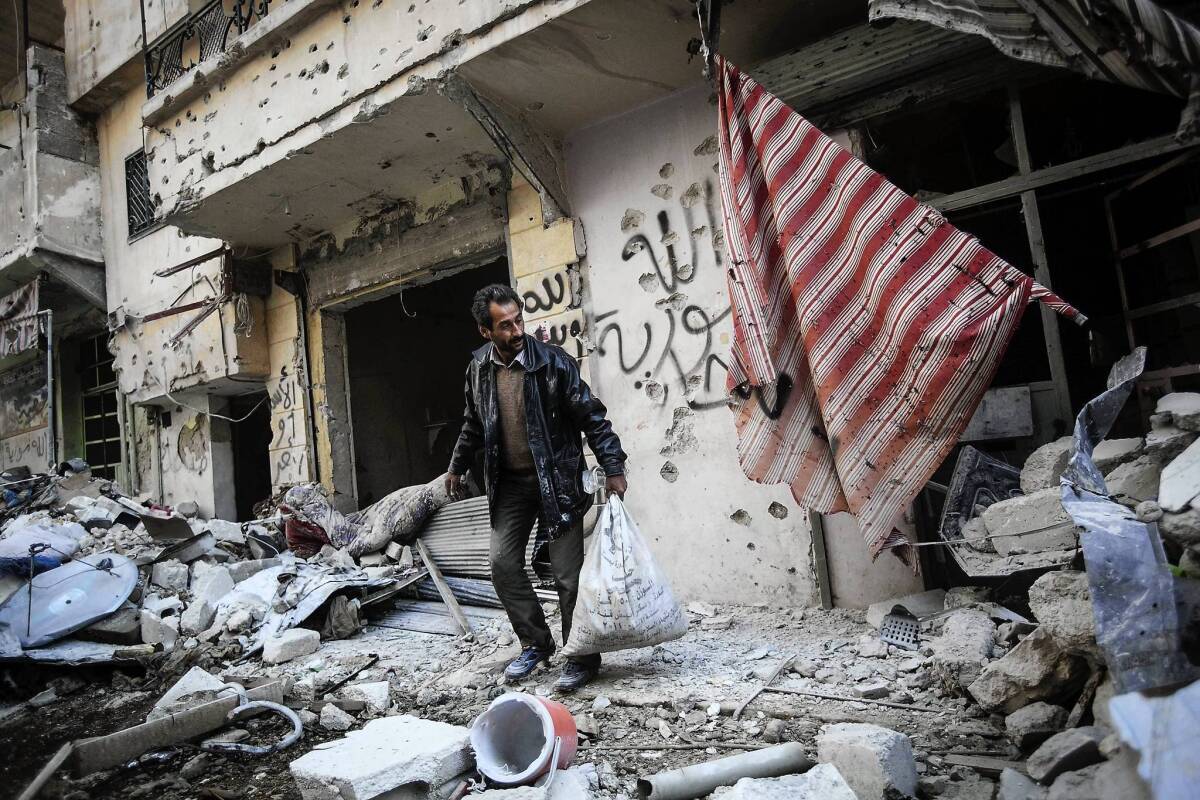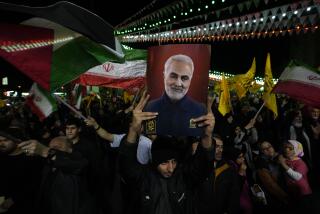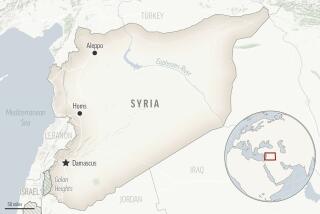U.S. warns Syria regime against using chemical weapons

BEIRUT — The United States bluntly warned Syrian President Bashar Assad against using chemical weapons as his forces lose ground to rebel fighters, and the United Nations said it was pulling nonessential foreign staff from Syria because of deteriorating security.
Warnings from President Obama, Secretary of State Hillary Rodham Clinton and other officials Monday reflected U.S. concerns over new intelligence indicating that Syria might be preparing to unleash some of its chemical agent stockpiles.
“The world is watching,” Obama said, addressing Assad in remarks at the National War College in Washington. “The use of chemical weapons is, and would be, totally unacceptable. And if you make the tragic mistake of using these weapons, there will be consequences, and you will be held accountable.”
The comments came amid indications that after more than 20 months, the tide of battle could be turning against Assad. In recent weeks, rebels have seized large swaths of territory, especially in the east and northwest. They also have overrun a number of military bases and key strategic installations, including oil wells and a hydroelectric dam.
Battles have been raging for days in rebellious suburbs of Damascus, and last week rebels managed to shut down the road to the international airport southeast of the capital, forcing flight cancellations. The government brought in reinforcements to secure the airport road, but reports Monday indicated that battles continued just outside the capital.
Rebels say the capture of a facility near Aleppo known as Base 46 last month after a lengthy siege yielded a stash of shoulder-fired missile launchers. The development could help neutralize the government’s overwhelming advantage in air power. Assad’s forces have increasingly turned to aerial attacks as its ground troops have been stretched thin and depleted through desertion and casualties. Rebels say one of the missiles has already been used to down a government attack helicopter.
Reports surfaced from multiple sources Monday that top Foreign Ministry spokesman Jihad Makdissi, the public face of the Syrian government, had defected. Makdissi is an English-speaking Christian who publicly defended the regime with passion for months, although he appeared to have been sidelined in recent weeks.
If his defection is confirmed, he would join high-ranking generals, a former prime minister and an air force colonel who fled with his MiG fighter jet to neighboring Jordan.
In another development, Nabil Elaraby, chief of the Arab League, told the French news service Agence France-Presse that Assad’s regime risked collapse “any time,” citing recent opposition military and political gains.
The United Nations said it was withdrawing nonessential international staff from Syria because of security concerns and suspending movement within the country until further notice. The U.N. has about 1,000 foreign and local staff members in Syria.
The country is in desperate need of aid. The war has displaced about 1.5 million Syrians internally, according to official estimates, and prompted more than 500,000 others to flee the country, mostly to neighboring nations.
There is still considerable debate among analysts about whether recent rebel gains mark a tipping point in the conflict. But there is wide agreement that Assad is facing an increasingly difficult battle for survival.
“Certainly something has changed in the last couple of weeks,” said Marina Ottaway, a Middle East analyst with the Carnegie Endowment for International Peace in Washington. “There is no doubt that the rebels are showing much greater capacity to fight and are much better armed.”
Analysts cautioned, however, that Assad has shown resiliency.
His government has survived major blows, including the assassination of four top security aides in a July bombing in Damascus. It retains the loyalty of a professional army and air force.
Although a battle for Aleppo, the commercial hub, has dragged on for more than four months, other major cities, including Damascus, remain largely under government control. Assad continues to enjoy the backing of Moscow and Tehran.
In addition, Assad has the unyielding support of his minority Alawite sect, many of whose members view the conflict as a fight to the death against Islamic extremists from the nation’s Sunni Muslim majority. Other Assad supporters fear that his fall could usher in an Iraq-like scenario of anarchy and sectarian bloodletting.
“It seems to me the regime still has some fighting power,” said Ottaway, speaking by telephone from Washington.
Nonetheless, rebel fighters on the ground have taken to repeating a kind of motto: “We are coming for you, Bashar.”
Western officials say they fear that a desperate Assad could turn to the nation’s large stockpile of chemical weapons.
A senior U.S. official said Monday that the United States had received intelligence in recent days indicating that Syria’s military was making preparations for the possible use of such weapons against the rebels.
“They are making certain preparations that have the look and feel of potential use,” said the official, who spoke on condition of anonymity in discussing intelligence information. The official would not provide details about the steps or the chemical agents involved.
“This is the Syrian military apparatus,” the official said. “This is not some splinter group.”
Intelligence agencies have seen evidence that Syria is moving supplies of chemical weapons materials to various sites in the country, according to a second U.S. official.
Syria is known to have supplies of mustard gas, a blister agent, and sarin, a nerve gas. U.S. officials have said they are using satellites and other surveillance systems to keep tabs on the weapons.
The Syrian government has never publicly acknowledged possessing chemical weapons. On Monday, it repeated earlier assertions that it would not use such weapons, “if they exist,” against its own people.
Syria said it had made this point “repeatedly” to Washington, Moscow and the United Nations, and pointed to the 2003 U.S.-led invasion of Iraq. Although Iraqi President Saddam Hussein was suspected of having weapons of mass destruction, none were found.
“These fabrications are aimed basically at misleading the U.S. and world public opinion and diverting attention away from the U.S. involvement in the Syrian issue in terms of the financial, logistic and political support it provides the terrorist groups,” the Syrian statement said.
Syria calls the rebels fighting to overthrow its government Al Qaeda-linked “terrorists” aided by the United States and its allies, including Turkey, Saudi Arabia and Qatar.
Syria’s statement did not repeat an assertion made in July that Damascus would deploy chemical weapons only “in the event of external aggression” against the country.
A senior Middle East diplomat said it was clear that Syria’s leadership understands that the use of chemical weapons would be a “game changer” that would draw a sharp reaction from world powers that have generally been reluctant to get too deeply involved in the conflict.
U.S. officials refused to say how they would respond if Syria did use chemical weapons. They have said that the Pentagon has contingency plans to send small teams of special operations troops into Syria if the White House decided it needed to secure chemical weapons depots now controlled by Assad’s forces.
The situation would change significantly if Syria used the weapons against its own people, a move that would prompt widespread international condemnation and greatly increase pressure for intervention by the U.S. and other countries.
McDonnell reported from Beirut and Richter from Washington. Times staff writers David S. Cloud and Shashank Bengali in Washington and special correspondent Rima Marrouch in Beirut contributed to this report.
More to Read
Start your day right
Sign up for Essential California for news, features and recommendations from the L.A. Times and beyond in your inbox six days a week.
You may occasionally receive promotional content from the Los Angeles Times.







